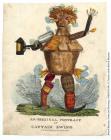Farewell to my family, it's now I must leave you
That far fatal shore in chains we shall see
Although we are taken, do not be mistaken
As brothers in union we shall be free
They can bring down our wages
Starve all our children
In chains they can bind us, steal all our land
They can mock our religion
From our family divide us
But they can't break the oath of a Tolpuddle man
To those who rule us we are the Dissenters
Do your duty be thankful don't complain we are taught
For God in his wisdom divided his Kingdom
For few to have much while so many have nought
As brothers together with an oath we will bind us
The labouring man in all England shall rise
Though Frampton has framed us they never will tame us
Arise men of Britain we'll yet win the prize
That far fatal shore in chains we shall see
Although we are taken, do not be mistaken
As brothers in union we shall be free
They can bring down our wages
Starve all our children
In chains they can bind us, steal all our land
They can mock our religion
From our family divide us
But they can't break the oath of a Tolpuddle man
To those who rule us we are the Dissenters
Do your duty be thankful don't complain we are taught
For God in his wisdom divided his Kingdom
For few to have much while so many have nought
As brothers together with an oath we will bind us
The labouring man in all England shall rise
Though Frampton has framed us they never will tame us
Arise men of Britain we'll yet win the prize
envoyé par Bernart Bartleby - 29/4/2015 - 10:50
×
![]()






Parole e musica di Graham Moore
La canzone che dà il titolo al disco
Nel Regno Unito intorno al 1830, negli anni che seguivano l’abrogazione dell’infame “Combination Act” del 1799, che fino ad allora aveva impedito ai lavoratori di organizzarsi tra di loro per ottenere migliori condizioni, un gruppo di braccianti di Tolpuddle, un villaggio nel Dorset, costituirono tra di loro una società segreta di mutuo soccorso, la Friendly Society of Agricultural Labourers, per lottare insieme contro le diminuzioni salariali che costantemente colpivano la loro categoria. La cosa allarmò i proprietari terrieri locali, i quali chiesero aiuto alle autorità…
Fu così che nel 1833 gli artefici dell’iniziativa furono arrestati, processati e condannati ai bagni penali in Australia, e solo per aver creato una piccola cellula sindacale. Questa la poesia che uno di loro, George Loveless, scrisse subito dopo aver ricevuto la sentenza alla deportazione e a sette anni di lavori forzati:
From plough, from anvil, and from loom;
We come, our country's rights to save,
And speak a tyrant faction's doom:
We raise the watch-word liberty;
We will, we will, we will be free!”
I “Tolpuddle Martyrs” furono liberati tra il 1836 ed il 1837, e solo grazie ad una mobilitazione popolare nel corso della quale furono raccolte 800.000 firme in loro sostegno.